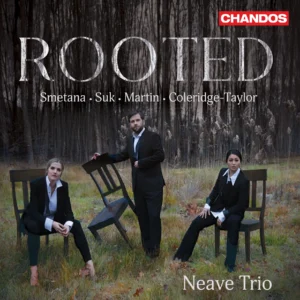Neave Trio – Rooted (CD Review)
Neave Trio
Rooted
Chandos Records (2024)
Neave Trio – violinist Anna Williams, cellist Mikhail Veselov, and pianist Eri Nakamura – has recently made several imaginative recordings for Chandos. Rooted is influenced by traditional music and by Antonín Dvořák, who brought the concept of using your country of origin’s folk music in concert works to the United States and, in the case of one of the programmed composers, influenced those in the UK as well.
Bedrich Smetana (1824-1884) was thought of as the premiere Czech composer of his day. Piano Trio, Op. 15 (1857), was written in the midst of grief at the loss of his four-year old daughter Bedřiška. The first two movements, a sonata and a march-like scherzo, take on a mournful cast. After stricken music at its outset, the soaring tune in the finale seems transcendent. The piece is known to be a challenging example of the piano trio literature, but the members of Neave Trio perform it fluently and expressively. Particularly admirable are the inflections of dynamics and slight fluctuations of tempo, both to expressive ends.
A composer of African descent on his father’s side and British on his mother’s, Samuel Coleridge Taylor (1875-1912) used American folk and vernacular melodies in his music, arranging spirituals from a set of piano pieces as Five Negro Melodies for Piano Trio (1906). “Sometimes I Feel Like a Motherless Child” employs chromaticism and various borrowed sevenths to replicate the inflections a gospel choir would use to spice up their performance. “I Was Way Down Yonder” takes on the ambience of parlor music. “Didn’t My Lord Deliver Daniel” has a sheen of piano glissandos and corresponding slides in blues scales played by the strings. An octave-doubled descent through the blues scale is followed by an unadorned tutti major triad. “They Will Not Lend Me a Child” starts in a minor key blues, with chromatic adornments and colorful harmonies in the piano buoying a melody in the violin. A winsome countermelody in the cello makes for a supple, poignant duet. The piano adds echoes of both’s melodic gestures and then points them up with rolled arpeggios. Its conclusion moves into a major key with borrowed chords that creates a touching conclusion. The final movement,”My Lord Delivered Daniel” has a repeated refrain over barn dance rhythms. Its eventual destination is full of emphatic octaves underscoring quickly shift harmonies.
Joseph Suk studied with Dvořák, and his Petit Piano Trio, Op. 2, was written under the elder composer’s tutelage. Given its early status in Suk’s catalog, it is remarkably assured. A typical three-movement form, it has a boisterous sonata allegro, a gently dancing andante movement, and a vivace allegro movement that is the best of the three, an energetic conclusion that displays the technical and interpretative skills of the Neave Trio to best advantage.
The final work on the recording emphasizes the connection between French composers and Irish folk music: Frank Martin’s Trio sur des mélodies populaires irlandaises. The first movement briskly explores multiple pentatonic tunes. The second features a ballad, first played solo in the cello, then accompanied with modal harmonies in the piano, and finally explored contrapuntally by the entire trio. Almost inevitably, the last movement is a jaunty gigue with Martin’s characteristic impressionist harmonic inflections.
Rooted is a well-conceived program that Neave Trio executes with seamless ensemble coordination and distinctive musicianship. Recommended.
-Christian Carey
